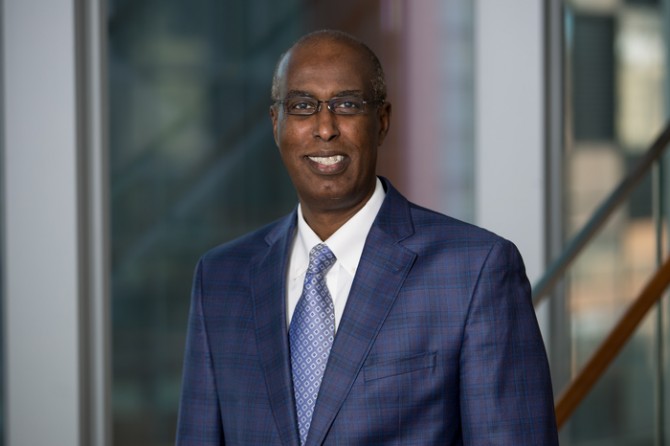Ibrahim named Weill Cornell Medicine dean for diversity and inclusion
By Kathryn Inman
Dr. Said Ibrahim, a physician-scientist who investigates why health outcomes vary among demographic groups, has been appointed the inaugural senior associate dean for diversity and inclusion at Weill Cornell Medicine, effective Jan. 2. Ibrahim will lead the Office of Diversity and Inclusion’s efforts to unify diversity initiatives and foster a stronger culture of equity and belonging throughout the institution.
Weill Cornell Medicine’s Office for Diversity and Inclusion is committed to nurturing faculty and students whose varied backgrounds can inspire new perspectives and approaches to improve human health. Ibrahim will work to realize the strategic vision of Dr. Augustine M.K Choi, the Stephen and Suzanne Weiss Dean of Weill Cornell Medicine, who has elevated diversity as an essential pillar of the institution’s mission, along with clinical care, research and education.
The Office of Diversity and Inclusion will promote institutional initiatives to recruit, retain and nurture minority physicians, scientists and trainees who hail from communities underrepresented in medicine, as well as women and those who identify as lesbian, gay, bisexual and transgender. The office will also strive to support students, faculty and trainees at every stage of their careers, working to cultivate a diverse and inclusive environment in clinic, lab and classroom.
“Diversity is essential for the health care workforce, and is a core value of Weill Cornell Medicine,” Choi said. “Bringing together our academic community’s unique perspectives and abilities not only leads to innovation, but also allows us to provide the best care for a diverse population and the best education for a diverse student body. Dr. Ibrahim is the ideal person to advance this important institutional mission and ensure a rich environment of equality and inclusiveness at Weill Cornell Medicine.”
“This role and the Office of Diversity and Inclusion’s mission really resonate with me personally,” said Ibrahim, chief of the Division of Healthcare Delivery Science and Innovation in the Department of Healthcare Policy and Research at Weill Cornell Medicine, who emigrated from Somalia in the mid-1980s. “Having grown up in East Africa, I understand firsthand how inequalities in health care access can significantly affect people’s lives. Diversity and inclusion – things that people had fought passionately for during the civil rights movement – made it possible for someone like me to attend medical school in the United States. It’s important to me that we maintain and grow that kind of opportunity for everyone.”
Weill Cornell Medicine has established several programs that expose women, minority and economically disadvantaged college students to educational and career opportunities in medicine and science. The Travelers Summer Research Fellowship Program, established in 1969, has reached more than 1,200 pre-medical students; as of 2015, nearly 83 percent of participants went on to medical school. Weill Cornell Medicine’s Advancing Cornell Career Experiences for Science Students (ACCESS) and Gateways to the Laboratory Summer Program are each celebrating 25-year anniversaries this year and serve as pipelines into doctorate and joint medical-doctorate degrees. ACCESS has 216 alumni; Gateways has 309.
To build on this momentum, Choi in the past year has launched numerous initiatives to foster diversity and inclusion campuswide. Among them is the newly established Diversity Week, an event to showcase cutting-edge academics and initiatives focused on enhancing diversity and reducing health care disparities. Choi also established the Dean’s Diversity and Healthcare Disparity Research Awards, which provide funding to investigators whose work seeks to improve the health of women and underrepresented minorities and achieve health equity locally and globally; and Dean’s Diversity Scholarships, which annually award full-tuition scholarships to two medical students from groups underrepresented in medicine who have financial need.
Ibrahim and his team in the Office of Diversity and Inclusion – which includes associate deans of diversity and inclusion Drs. Linnie Golightly and Rache Simmons, and assistant deans of diversity and student life Marcus Lambert and Elizabeth Wilson-Anstey – will strive to enhance these initiatives. They will unify other diversity programs throughout the institution to maximize their impact and enable continuous evaluation of their success.
These efforts will lay the groundwork for attracting and developing a new cadre of diverse faculty members who are committed to the same institutional ideals. In collaboration with the institution’s new Mentoring Academy and the Diversity Center of Excellence – which operates under the auspices of the Cornell Center for Health Equity – the office will seek to nurture minority and female talent at all career levels through mentorship and other activities. Diversity leaders will also strive to increase the representation of women faculty at higher academic ranks and in leadership positions.
Nearly 20 percent of medical students at Weill Cornell Medical College hail from communities underrepresented in medicine. Weill Cornell Graduate School of Medical Sciences has also strengthened diversity efforts, with an average of 25 percent of domestic doctoral students from communities underrepresented in science.
“We want our physicians, researchers and trainees to be representative of the populations we serve, so patients see us as a reflection of who they are,” said Ibrahim, who also serves as the Department of Healthcare Policy and Research’s vice chair for development and strategy. “Our diversity initiatives will help us achieve that goal and position us as a leader in the health care industry, while also enriching the experiences of our academic community.”
Kathryn Inman is associate editor at Weill Cornell Medicine.
Media Contact
Get Cornell news delivered right to your inbox.
Subscribe

